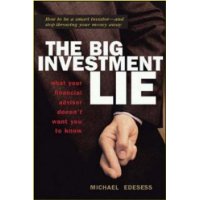| 商家名称 |
信用等级 |
购买信息 |
订购本书 |
|
|
 |
The Big Investment Lie: What Your Financial Advisor Doesn't Want You to Know |
 |
|
 |
The Big Investment Lie: What Your Financial Advisor Doesn't Want You to Know |
 |

基本信息·出版社:Berrett-Koehler Publishers
·页码:298 页
·出版日期:2007年01月
·ISBN:1576754073
·条形码:9781576754078
·装帧:精装
·正文语种:英语
·外文书名:做精明的投资者, 别让自己的钱打水漂: 投资大谎言: 理财顾问不愿你知道的真相 麦克尔.艾狄希斯 著
内容简介 在线阅读本书
This expos? of regularized falsehood reveals the unfortunate truth behind the financial advisory industry ? that professional investors cannot, and never have been able to, beat market averages. Written by a well-credentialed insider, this book additionally provides detailed insights into where people should really invest their money.
作者简介 MICHAEL EDESESS is an economist and mathematician with experience in the
investment field and in the energy and environment fields. He was a
founding partner and chief economist of the Lockwood Financial Group until
its sale for $200 million to The Bank of New York in September 2002.
Previously an independent consultant to institutional investors, his
clients included several of the largest investment banking and consulting
firms. Dr. Edesess has spoken at conferences on investment research and
taught international finance at the graduate school level, has been
published in The Wall Street Journal and The Journal of Portfolio
Management, and has been interviewed on CNBC. He was a Senior Fellow at the
University of Denver's Institute for Public Policy Studies and taught a
wide variety of courses as an adjunct professor.
编辑推荐 From Publishers Weekly Having learned deceptive sales practices as a teenager selling magazine subscriptions, Edesess sold overpriced credit life insurance before becoming an investment adviser after a boss told him that "the way to make money is to handle money." By 2004, he found himself in Florida, failing to entice investors into a trading scheme that lost 80% over six months, when the company promoting the idea collapsed without paying him. That experience, he says, "provoked me to write" this book. But his pose as a reformed sinner is unconvincing. The how-to chapter on deceptive sales is more animated than his cursory review of academic literature arguing for low-cost, diversified, buy-and-hold strategies. He likes self-promoting investment failures, like the ones created by Charles Ponzi and the Beardstown Ladies, but disparages successful investors like Warren Buffett, Ed Thorp, George Soros and Julian Robertson. Edesses's most useful ideas are covered better in John Bogle's books, among others.
(Jan.) Copyright © Reed Business Information, a division of Reed Elsevier Inc. All rights reserved.
专业书评 From Publishers Weekly Having learned deceptive sales practices as a teenager selling magazine subscriptions, Edesess sold overpriced credit life insurance before becoming an investment adviser after a boss told him that "the way to make money is to handle money." By 2004, he found himself in Florida, failing to entice investors into a trading scheme that lost 80% over six months, when the company promoting the idea collapsed without paying him. That experience, he says, "provoked me to write" this book. But his pose as a reformed sinner is unconvincing. The how-to chapter on deceptive sales is more animated than his cursory review of academic literature arguing for low-cost, diversified, buy-and-hold strategies. He likes self-promoting investment failures, like the ones created by Charles Ponzi and the Beardstown Ladies, but disparages successful investors like Warren Buffett, Ed Thorp, George Soros and Julian Robertson. Edesses's most useful ideas are covered better in John Bogle's books, among others.
(Jan.) Copyright © Reed Business Information, a division of Reed Elsevier Inc. All rights reserved.




